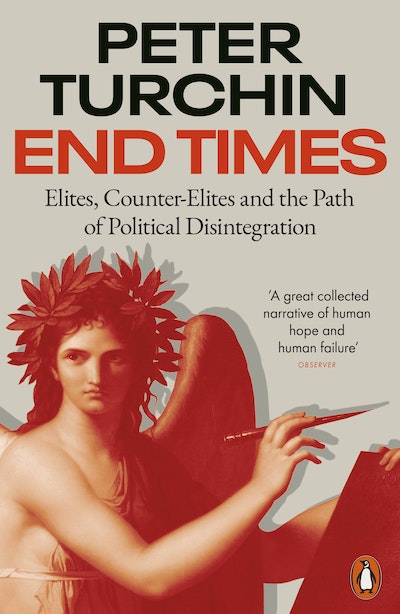- Published: 11 June 2024
- ISBN: 9780141999289
- Imprint: Penguin Press
- Format: Paperback
- Pages: 368
- RRP: $26.99
End Times
Elites, Counter-Elites and the Path of Political Disintegration
- Published: 11 June 2024
- ISBN: 9780141999289
- Imprint: Penguin Press
- Format: Paperback
- Pages: 368
- RRP: $26.99
The future-gazing guru I find the most intriguing is a former biologist called Peter Turchin who calls this decade 'the turbulent twenties'
Helen Lewis, BBC Radio 4
Mr Turchin is something of a celebrity in certain circles and has piqued economists' interest in the discipline of "cliodynamics", which uses maths to model historical change
Economist
Scintillating. . . Turchin's elegantly written treatment looks beneath partisan jousting to class interests that cycle over generations, but also yields timely policy insights. It's a stimulating analysis of antagonisms past and present, and the crack-up they may be leading to
Publishers Weekly
"History is hopelessly complex and unpredictable": so say most historians. If they were right, we would all be in deep trouble, helpless against a myriad of looming disasters. But Peter Turchin has pioneered a new science of making history predictable - by applying methods that had already succeeded in other complex fields. You'll want to know what he sees lying ahead, and what we can do about it
Jared Diamond, author of Guns, Germs and Steel
Peter Turchin brings science to history. Some like it and some prefer their history plain. But everyone needs to pay attention to the well-informed, convincing and terrifying analysis in this book
Angus Deaton, winner of the Nobel Prize in Economics
Extraordinary. . . Turchin is a practitioner of "cliodynamics," an ambitious attempt to apply complexity theory and much else to human history. End Times is the culmination of many years of highly original and innovative work
Niall Ferguson, Bloomberg
A pre-eminent digital-age seer. . . Turchin set out to discover statistical patterns in the great flood of historical data that might predict future instabilities in societies. . . a great collected narrative of human hope and human failure
Tim Adams, Observer
Why is the world gripped by revolutions and civil wars? This provocative book blames the elites - we just have too many of them now
Sunday Times
It would be foolish for US leaders to ignore Turchin. If nothing else, the concept of elite overproduction is a good way to explain why elite education is now so costly, competitive and damaging for would-be elite kids and adults alike
Gillian Tett, Financial Times
A compelling analysis of why societies fail. . . Turchin's theory represents the most persuasive analysis of the historical forces assailing society in the present
James Marriott, The Times
Drawing on big data for societies across time and space, Peter Turchin shows that periods of political instability are inevitable. . . Turchin's model suggests that the 2020s are unavoidably set to be a period of disintegration. . . but that we can avoid another, perhaps deeper, period of social breakdown later in the century
Richard Reeves, Literary Review
Peter Turchin is among the most important writers for explaining why everything seems so unstable now. It's the end of a cycle. . . Essential reading
Jonathan Haidt
Across the west, popular misery and 'elite overproduction' are fuelling crisis, argues data-driven historian Peter Turchin. . . he provides a clear theory about how we got into this mess, and how to get out of it
David Shariatmadari, Guardian
From the man who predicted the rise of Trump - or someone very like him - a remarkably clear, data-driven explanation of why societies fall into crisis, and how to engineer a soft landing
Guardian



